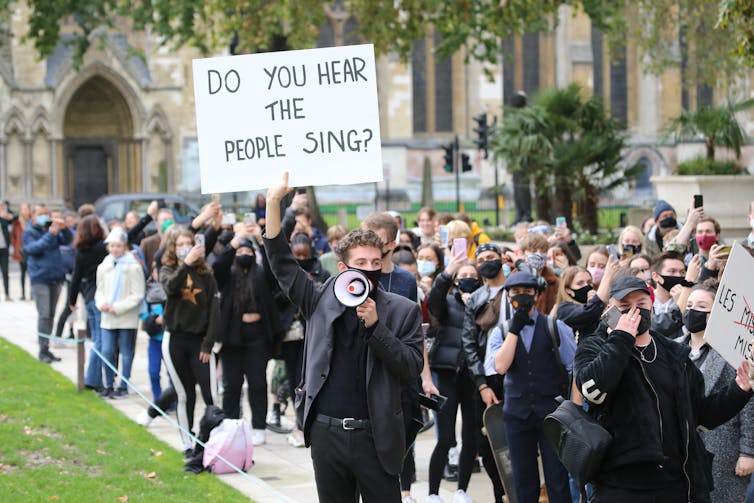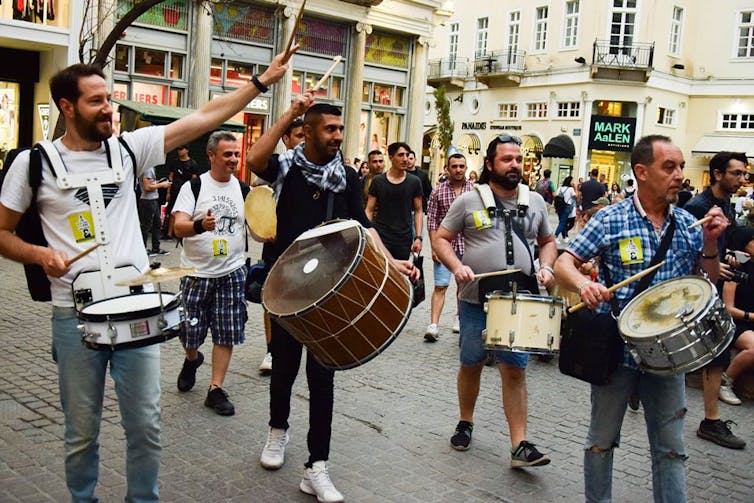On the evening of Sunday December 13 the president of the Greek Musicians’ Union stood in front of an empty auditorium at the Athens Music Hall, as thousands watched at home. Opening a virtual concert in support of music workers, his words were emotional – but firm:
We want to make known that the music we love and keeps us company in our most difficult and most beautiful moments, is the result of a complex form of labour, which takes toil, sacrifice and dedication.
The idea that musicians are workers is self-evident – yet somehow often disregarded. As a recent controversy involving the BBC has brought to the fore once again, employers, organisations and the state frequently assume that musicians will perform unpaid, merely for “exposure”.
My research on Greek musicians over the past 15 years has shown that work in artistic performance is as precarious as it is enjoyable. Musicians all over the world see creative opportunity in being “free” from permanent contractual employment, but these conditions often make them poorly paid, prone to exploitation, and insecure when it comes to work.
This is especially true in places that have suffered long periods of austerity, such as Greece and the UK. Under COVID-19, the precarious condition of performing workers has reached such breaking point that many will be unable to continue in their careers. Listening to musicians’ experiences could tell us a lot about how to defend the creative industries without leaving anyone behind.

Is music work or play?
When lockdown measures across Europe began, I was finishing a book on Musicians in Crisis, based on research in Greece since 2005. As I witnessed venues closing and gigs being cancelled across the globe, the words of my research participants resonated more than ever.
Musicians were eager to tell me that “crisis” in their work was somehow both new and familiar. Even as the infamous Greek financial crisis became particularly devastating after 2010, musicians experienced it as an intensifying of the precarity they had dealt with their whole lives.
As before, they still had to balance several, often contradictory, engagements. They still had to confront exploitative employers or fight for their right to get paid and receive legal benefits and social insurance. Musicians have always been conditioned in job insecurity – long before austerity and crisis. But as cultural academic Angela McRobbie has shown in the UK, these conditions of insecurity in the creative sector are “a way of laying the groundwork for the transformation of work, first for the few, then possibly for the many”. In other words, musicians may be a test-tube case for making other kinds of work more precarious.
As economic crisis intensified in Greece, these jobs became shorter term with lower pay, so musicians needed to work harder across more sectors. Gigs were scarcer, so they became more competitive, which made the idea of musician collectivism less appealing.

Unionisation and campaigning was not much in evidence throughout that period. This is partly because musicians in Greece do not see themselves as a collective campaigning body and receive very little support from the state or arts organisations. There is also considerable mistrust – even fear – of those in power in the music industry, who are often seen as rogue and unregulated.
As a result, during the crisis musicians had to battle it out individually and in isolation, leading to personal moments of rupture and issues of mental health, as was also the case on other countries, including the UK.
What worked for many of the musicians I interviewed was compartmentalising work and play. They emphasised that their work as hired performers needed to be properly compensated and safeguarded by hard-won labour rights. At the same time, they kept a portion of their activities separate in the realm of play, where they allowed themselves to indulge in creativity simply for their own pleasure.
Away from the precarious professional music industry, some joined groups where they could perform for enjoyment in smaller venues and for select audiences. These musical micro-cultures rarely generated much profit. Instead they were a way of resisting the commercialisation of the industry by finding expressive forms outside it. But division of work and play brings with it the danger of exploitation. The UK Musicians’ Union’s Work Not Play campaign speaks directly to this issue by stressing that the pleasure of making music should not excuse practices of unpaid labour.
Will Covid see the end of musicians?
Research commissioned by musical and cultural initiative Aptaliko – to be published in January 2021 – will show that the overwhelming majority of musicians in Greece have lost more than half of their earnings as a result of the pandemic. This mirrors recent findings in the UK, Spain, and Brazil.
Under these conditions, performing might become a luxury only for those who can afford it, while many musicians will abandon the profession altogether. Apart from the devastation this will cause arts professionals, it is also worth considering the impact on music itself. What kind of performing arts will we have if what remains only reflects the experiences and the sensibilities of the privileged few?
Thankfully, the pandemic crisis is also generating new solidarity and campaigns among performing workers. The UK Musicians’ Union is campaigning for universal basic income, and in Greece a new grassroots movement under the hashtag #SupportArtWorkers has been gathering momentum across sectors of creative professionals.
As many of these campaigns talk to one another and develop new demands, it is worth remembering that musicians and their colleagues in other creative industries have been in crisis for a long time. What they need in a post-Covid future is not a return to a perverse and unequal “normal”, but a radical rethinking of employment conditions that ensures fair pay and rights for all.![]()
Ioannis Tsioulakis, Senior Lecturer in Anthropology and Ethnomusicology, Queen's University Belfast
This article is republished from The Conversation under a Creative Commons license. Read the original article.
Comments